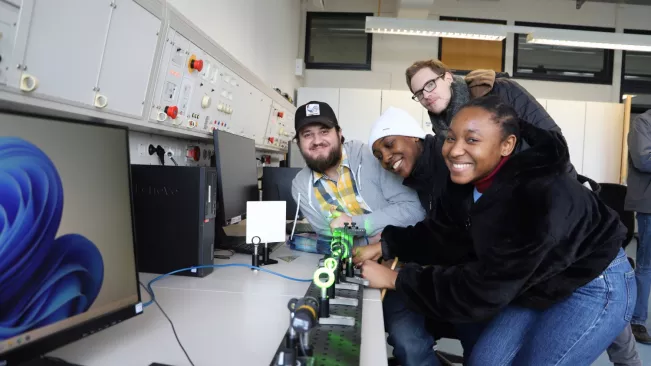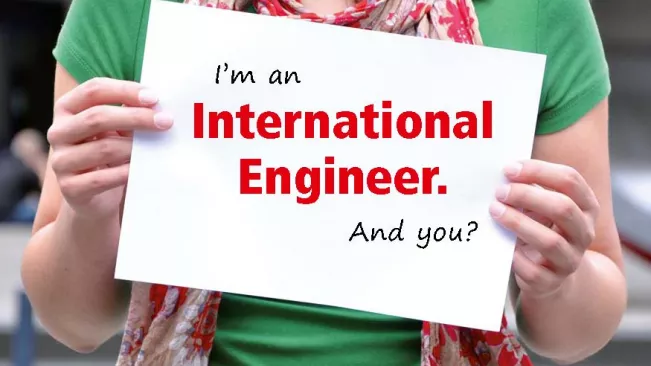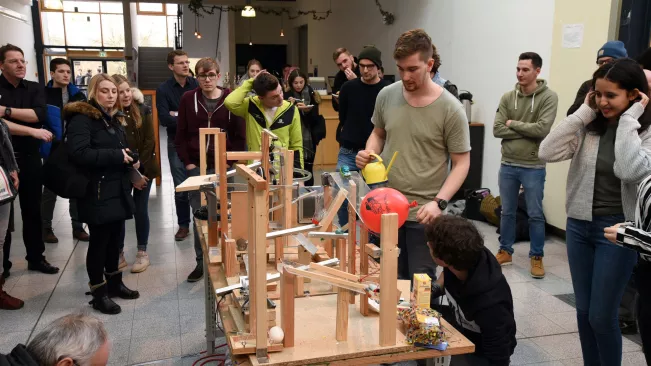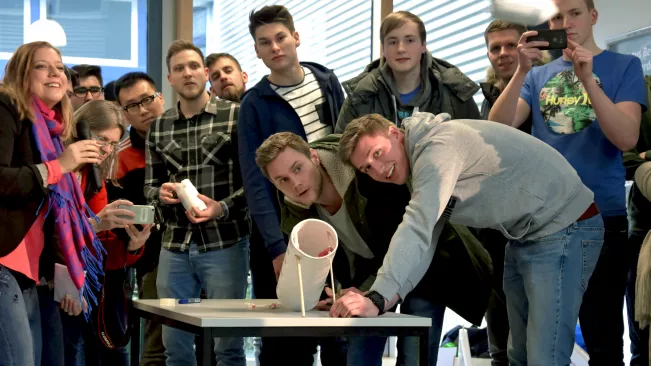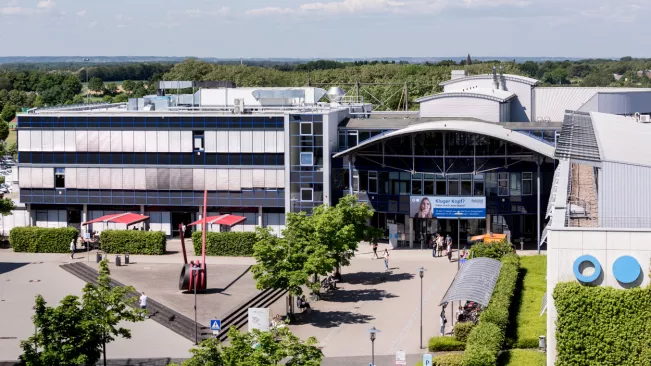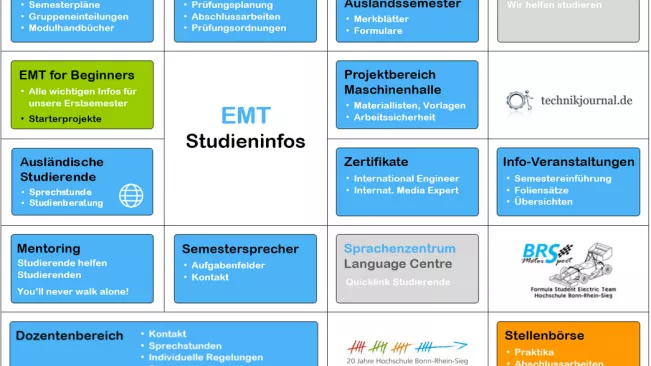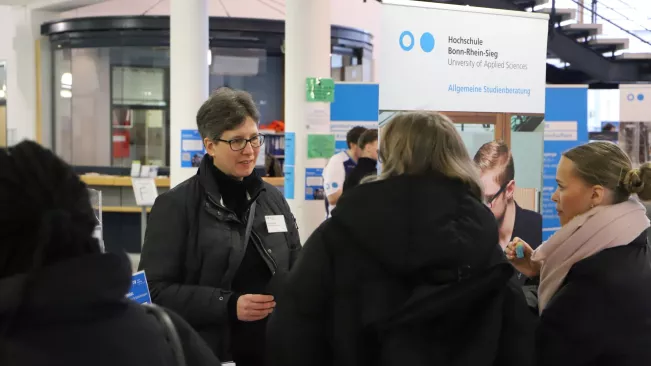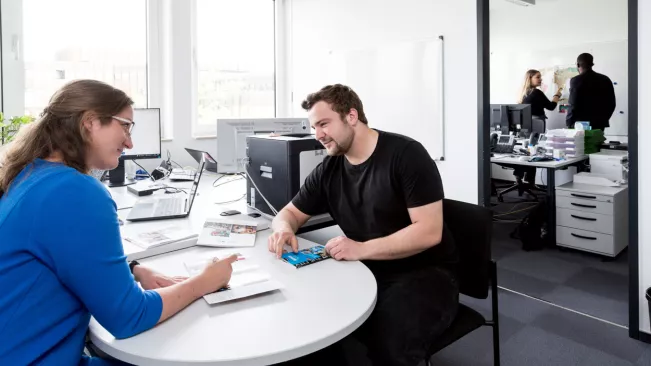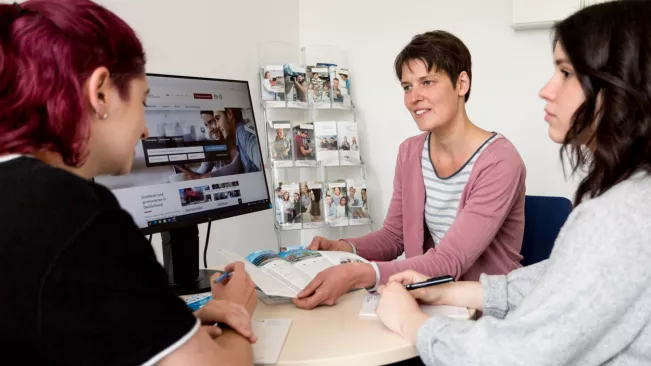Department of Engineering and Communication
Sustainable Engineering (BEng)
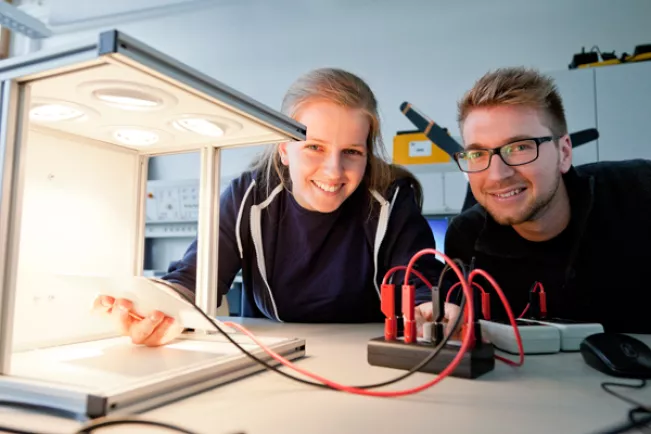
The profile of the degree programme
Today, engineers are needed who, in addition to their technical expertise, can think ‘outside the box’ and evaluate technologies and their development. This is where our Sustainable Engineering (B.Eng.) degree programme comes in. Basic engineering and science subjects form the basis of the programme, supplemented by subjects such as renewable energies, energy efficiency, life cycle analyses and environmental science.
The content of the degree programme includes the question of how the specialist knowledge acquired can be applied to sustainable development. Sustainable technical solutions take into account their impact on the environment, society and the economic system and thus ensure that future generations have the same opportunities and possibilities as we do today.
The degree programme combines content from the traditional electrical engineering and mechanical engineering degree programmes and supplements these with topics relating to sustainable development. Future issues relating to the energy transition, resource conservation and mobility are at the centre of the course content. In addition to sound engineering expertise, social skills, interdisciplinary problem-solving strategies and design expertise are among the key training objectives. Graduates are qualified to work purposefully on solving important future tasks. They can take responsibility for technical solutions because they can assess and categorise their effects.
The three guiding principles of the degree programme are:
Sustainable engineering focuses on the impact of technical solutions on society, the economy and the environment, i.e. the programme content promotes sustainable thinking and action in engineering professions.
- Sustainable engineering is an engineering degree programme, i.e. it lays all the foundations for a successful entry into engineering professions.
- Sustainable Engineering Science combines sub-areas from electrical engineering and mechanical engineering, i.e. the programme covers a broad range of topics.
„In my opinion, the special thing about the degree programme is the practical application of the material in various practical courses. In the first semester, for example, we applied what we had learnt in the laboratory and investigated the properties of photovoltaic modules and wind turbines and how their performance changes under external influences.”
Jannis Jeworowski - Student of Sustainable Engineering

Practical orientation
An essential part of the programme is to apply the knowledge acquired in a practical and solution-oriented manner: In laboratory practicals, for example, students test renewable energies and draw up life cycle assessments. Three project weeks take place each semester, alternating with four lecture weeks (our award-winning Four-One-Model) - they offer the opportunity to work on projects in small teams. Final theses can be written in co-operation with companies or research institutes.
Prospects and job prospects
Graduates of our Bachelor's degree programme in Sustainable Engineering (B.Eng.) are qualified for many industries. Careers for graduates can be found in the working environment of energy generation and distribution, in industrial companies and in engineering and consulting offices. In addition, the degree programme qualifies graduates to work in product development and product management in the manufacturing industry, both for the domestic market and in export-oriented companies. Further fields of work are available in the energy and mobility sector at public utilities, authorities and municipalities.
The Bachelor's degree qualifies students for direct admission to the Master's degree programme in Sustainable Engineering (M.Eng.) at Bonn-Rhein-Sieg University of Applied Sciences. Entry to the Master's degree programmes in Electrical Engineering (M.Eng.) or Mechanical Engineering (M.Eng.) is possible with additional coursework.
„On the one hand, I really like the Sustainable Engineering degree programme because the social relevance of the topics covered in the course could not be higher. On the other hand, I appreciate the broad range of subjects on the programme, which opens up many career opportunities.”
Bennett Schwanke - Student of Sustainable Engineering
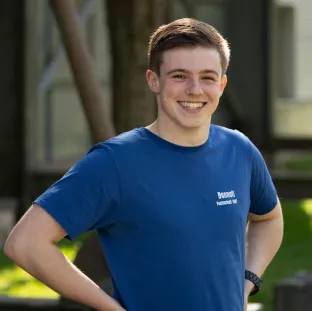
Study Facts
Degree
Bachelor's degree
Standard period of study
Seven semesters / 210 ECTS
Lecture language
German
Campus
Sankt Augustin
Start of study
Winter term
Type of study
Full-time
Admission requirements
Formal requirements for admission are either the entrance qualification for universities of applied sciences, a general higher education entrance qualification, a corresponding professional qualification or a previous qualification recognised as equivalent.
Admission type and enrolment deadline
The degree programme is free of admission. You can enrol from 15 June to 1 October for the start of the winter semester.
Language skills
All courses are held in German.
Costs
Only the current semester fee is payable for this degree programme: Link Semester fees and Administrative fees.
Contact points
Departmental Office Engineering and Communication
Campus
Sankt Augustin
Room
A 157
Opening hours
Montag bis Donnerstag: 09:00 - 15:00 Uhr
Freitag: 09:00 - 14:00 Uhr
Course guidance service Bachelor Sustainable Engineering
Campus
Sankt Augustin
Room
F 321
Opening hours
We look forward to hearing from you.
Contact to the Student Services
Opening hours
Telephone consultation hours: Monday - Friday: 10:00 - 12:00
Personal consultations by appointment only
IWK Student Council
Campus
Sankt Augustin
Room
A 041
Opening hours
Mondays to Fridays: just drop by!
Study workshop
Campus
Sankt Augustin
Room
Online
Opening hours
The Study Workshop takes place during the lecture-free period in the form of web conferences and online forums during normal working hours: The current online times of the lecturers and mentors can be found in the LEA course Studierwerkstatt.
Documents
to download
